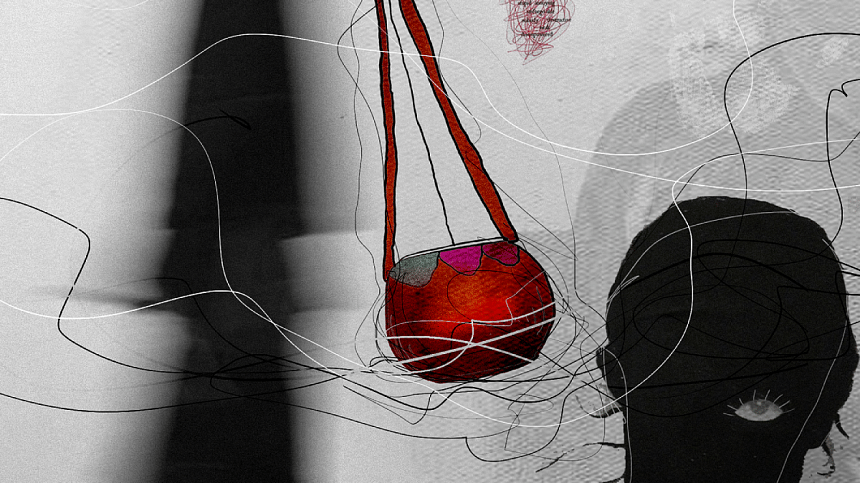Shantinagar

This entire city was engulfed in chaos.
Everywhere he went — the kachabazars, the bus stands, the banks of the poison-black river — there seemed to be no respite from noise, or from the concrete blocks of buildings, towering over him imposingly. Instead of trees, the roads were flanked by electric poles, and instead of branches, they were threaded by coils of wire more tangled than a crow's nest.
Clouds of dust always swirled around him, making him cough a little too much. He wondered what exactly, other than the prospect of money, made so many people gravitate towards this city like moths to flame. Even he knew that he would be sent to this ugly place as soon as he was of age. But why was he here now, so soon? How did he get here?
Then suddenly, from nowhere, all the clouds broke loose and crashed on his face.
Montu jolted awake from the shock of cold water. The others hovered over his head, giggling at his dumbfounded expression. In the bluish darkness of pre-dawn, he made out a plastic mug in Joshim's hand.
Before he could retaliate, Montu heard Ripon da's singsong voice coming from the doorway.
"Wake up, children!
The sun is rising,
And we must keep moving!"
At their leader's command, the boys and girls scurried off to pack the last of their things. Someone lobbed a gamchha at Montu to wipe his head. Before long, the group left the ramshackle hut of mud and thatch where the twelve of them had spent the last few nights. They were back on the narrow dirt path canopied by trees, the sky above painted in bruised purples and angry oranges. In the distance, a rooster announced the arrival of morning.
Ripon da was, as always, striding at the front, in his ratted clothes and wiry hair. If he sensed the children were lagging behind and showing the first signs of fatigue, he would start plucking his ektara and sing something to cheer them on. But he would not allow them to stop or rest until he explicitly commanded them to. He never really said they were forbidden to speak up; it was an unwritten rule. Another was that the children couldn't speak among themselves while they were on the road. Hence, they marched on, silently, to a destination whose existence Montu was growing sceptical of day by day.
Did Shantinagar really exist?
"Of course, it does!" Tuli told him the first night they stopped at the hut they just left behind.
Montu tried to convince his sister of his misgivings in the dark. They were behind the outhouse, facing away from the back of the hut so no one could see them. Tuli acted like she was still loyal to Ripon da, but he could tell from her constant blinking and her feigned incredulous expression that doubt had seeped into her heart, too.
"You can't say these things," Tuli had whispered finally, eyes widened in fear. "What will Ripon da think?"
Later in life, Montu would look back at how Ripon da had ensnared his web over their village. He couldn't recall the first time he saw the man, but he was a familiar face of the countless melas that passed through Hemganj throughout the years. He had a full, euphonious voice and an ektara, which he used to summon the attention of the villagers, mostly effective on the young. He plucked the one-stringed instrument and sang about his homeland, Shantinagar, somewhere between heaven and Earth — a utopian land of abundance where only peace reigned, because it was ruled by children with no adults to boss them around.
Then, somehow, Ripon da settled down in Hemganj. He would hold court every afternoon under the banyan tree in the bazar, regaling the children with tales of Shantinagar in his trademark singsong voice. Montu and Tuli would sit on the dirt around him with the other children, enthralled under the golden hue of the sun.
"Why did you leave that place if it's so peaceful?" Sohel, who rarely attended these sessions, asked once.
"Because I grew up," Ripon da deadpanned, eliciting giggles. "No grown-ups there, remember?"
Then came the warnings, especially from the older children who tried to avoid Ripon da as much as they could.
"Don't flock around him so much," cautioned Sohel, whose voice had just broken. "My father says he's an agent of the devil."
"Do you really believe everything he says?" Masuda would try to reason. "Whatever land he babbles on about sounds a bit too much like the description of paradise in the holy books."
A few days after nobanno, the morol of Hemganj interrupted their session with his henchmen, the doctor, and the headmaster in tow. These men never liked Ripon da.
"You've been filling these kids' heads with cow dung for far too long," the morol gnashed his teeth. "If I ever see you again, I will make sure you rot in prison."
Ripon da fled that very night, but not without leaving a message. Only the loyal few would sneak out to his hideout in the bamboo grove near Khaturbari. There, they saw a different version of Ripon da. He was no longer the merry songster they knew, but a solemn strategist. Ripon da hatched plans of their escape, promising to guide them by routes where they would never get caught. They were in awe of how much he knew of the world far beyond the environs of Hemganj.
The final destination was Shantinagar, where they could live happily for the rest of their childhood, away from narrow-minded adults.
Montu realised, as the sky turned bluer, that it had been two weeks since he left home. Two weeks since he had his favourite meal of his mother's aloo bhorta with rice. It would take him another two weeks for the resentment to grow into a decision fuelled by anger, for him to diffuse his rage into Tuli through hushed arguments on their stopovers. He was not capable of starting a rebellion against such an enigmatic riddle as Ripon da, whose knack for authoritarianism was beginning to grow more overt, but he could at least take his sister back home with him. He would remember how the ugly city in his dream was more real than whatever Shantinagar was.
It was early when Tuli and Montu ran away. The sky was in bruised purples and angry oranges.
Years later, on a Friday when they both had a day off, Montu and Tuli would go to Shantinagar. Dhaka was extremely alienating with the sheer magnitude of its chaos, but after years of adjustments and readjustments, this place felt more like home than Hemganj, which they tried to visit on long holidays.
They would wander in silence as the cacophony engulfed them, stopping near Rajarbagh Police Lines, and watch the construction work of a flyover.
"Ripon da didn't lie, then," Tuli would break the silence. "Shantinagar truly exists."
They would laugh, but only briefly, because they would mourn the rest of their friends who still hadn't returned to their families.
Adhora Ahmed listens to too many "sad white boy" songs. Recommend her better music at [email protected]

 For all latest news, follow The Daily Star's Google News channel.
For all latest news, follow The Daily Star's Google News channel. 








Comments